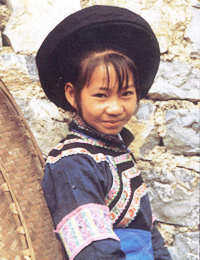 The Shui ethnic minority has a population of 345,993 (as of 1990), spreading over the upper reaches of the Duliu River and to the south of the Miaoling mountains in Guizhou Province, with the majority living in the Sandu Shui Autonomous County, and some scattered in the neighboring counties and Guangxi Zhuang Autonomous Region.
The Shui ethnic minority has a population of 345,993 (as of 1990), spreading over the upper reaches of the Duliu River and to the south of the Miaoling mountains in Guizhou Province, with the majority living in the Sandu Shui Autonomous County, and some scattered in the neighboring counties and Guangxi Zhuang Autonomous Region.
The Shui language belongs to the Zhuang-Dong Austronesian of the Chinese-Tibetan Phylum, with three dialects. The Shuis used to have an archaic writing script, some of which were pictographs, while others resembled Chinese characters written upside down. Except for scores of these ancient words that are still used for religious purposes, the Shuis mainly use the Chinese characters in their daily lives.
The Shuis are probably the descendants of the Luoyue people, one of the early tribes that lived along China's southeastern coast before the Han Dynasty (206BC-24AD). They adopted their present name in the end of the Ming Dynasty (1368-1644). The Shuis call themselves Sea Water, meaning people of water. During the two centuries between 1640 and 1840 of the Qing Dynasty, with the emigration of the Hans to the upper reaches of the Duliu River and the Longjiang River, the Shui economy continued to develop. Farm production saw a marked increase, and some people quit farming and became handicraftsmen.
The Shuis are agricultural folk. They live on rice, but supplement it with corn, wheat and sweet potatoes. They grow peppers, which are exported to the countries of Southeast Asia. The Shuis, men and women, like drinking wine, especially rum.
The Shuis often dress in black or blue. They are believers of polytheism. Catholicism that came to the area in the late Qing Dynasty (1644-1911) has very few converts.
The Shui people make beautiful handicrafts -- embroideries, batiks, paper cuts and woodcarvings. They boast a treasure house of colorful oral literature and art, including poetry, legends, fairy tales and fables.
They are good dancers. "Lusheng Dance" and "Copper Drum Dance" are the most popular dances enjoyed by all on festive occasions. Traditional musical instruments includegongs, drums,lusheng,huqinandsuona horns.
The Shuis have a calendar of their own which takes the ninth lunar month as the beginning of a new year, and their biggest festival is the Duan Festival which is celebrated with great pomp after the autumn harvest at the beginning of the 11th lunar month every year. The other two traditional festivals are the Dragon Worshipping Festival on March 3rd and the Mountain Forest Worshipping Festival in June.
